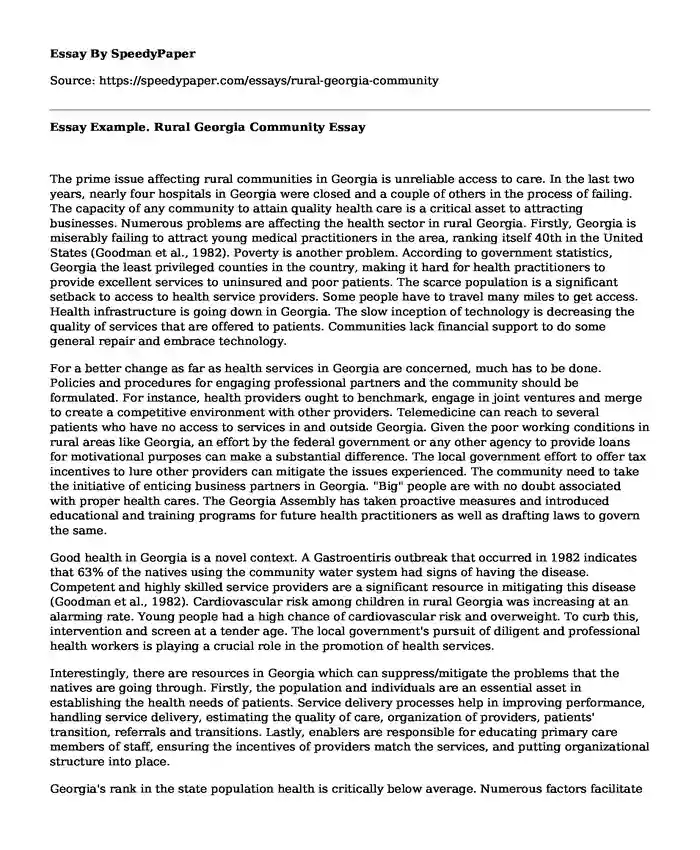
| Type of paper: | Essay |
| Categories: | Community Healthcare policy Community health |
| Pages: | 3 |
| Wordcount: | 780 words |
The prime issue affecting rural communities in Georgia is unreliable access to care. In the last two years, nearly four hospitals in Georgia were closed and a couple of others in the process of failing. The capacity of any community to attain quality health care is a critical asset to attracting businesses. Numerous problems are affecting the health sector in rural Georgia. Firstly, Georgia is miserably failing to attract young medical practitioners in the area, ranking itself 40th in the United States (Goodman et al., 1982). Poverty is another problem. According to government statistics, Georgia the least privileged counties in the country, making it hard for health practitioners to provide excellent services to uninsured and poor patients. The scarce population is a significant setback to access to health service providers. Some people have to travel many miles to get access. Health infrastructure is going down in Georgia. The slow inception of technology is decreasing the quality of services that are offered to patients. Communities lack financial support to do some general repair and embrace technology.
For a better change as far as health services in Georgia are concerned, much has to be done. Policies and procedures for engaging professional partners and the community should be formulated. For instance, health providers ought to benchmark, engage in joint ventures and merge to create a competitive environment with other providers. Telemedicine can reach to several patients who have no access to services in and outside Georgia. Given the poor working conditions in rural areas like Georgia, an effort by the federal government or any other agency to provide loans for motivational purposes can make a substantial difference. The local government effort to offer tax incentives to lure other providers can mitigate the issues experienced. The community need to take the initiative of enticing business partners in Georgia. "Big" people are with no doubt associated with proper health cares. The Georgia Assembly has taken proactive measures and introduced educational and training programs for future health practitioners as well as drafting laws to govern the same.
Good health in Georgia is a novel context. A Gastroentiris outbreak that occurred in 1982 indicates that 63% of the natives using the community water system had signs of having the disease. Competent and highly skilled service providers are a significant resource in mitigating this disease (Goodman et al., 1982). Cardiovascular risk among children in rural Georgia was increasing at an alarming rate. Young people had a high chance of cardiovascular risk and overweight. To curb this, intervention and screen at a tender age. The local government's pursuit of diligent and professional health workers is playing a crucial role in the promotion of health services.
Interestingly, there are resources in Georgia which can suppress/mitigate the problems that the natives are going through. Firstly, the population and individuals are an essential asset in establishing the health needs of patients. Service delivery processes help in improving performance, handling service delivery, estimating the quality of care, organization of providers, patients' transition, referrals and transitions. Lastly, enablers are responsible for educating primary care members of staff, ensuring the incentives of providers match the services, and putting organizational structure into place.
Georgia's rank in the state population health is critically below average. Numerous factors facilitate this outcome. With a population of 9.6million people, the state prides itself as one of the most populous regions in the United States (Davis et al., 2005). The ethical and racial diversity characterizing Georgia is a significant setback in achieving better health services. The states low economy and high poverty level remains a nightmare to her peoples' health status. Rural area, which covers the bigger part of Georgia, is characterized by poor working conditions. These factors ultimately result in a considerable decline in service delivery. In consideration of these perilous aspects affecting Georgia, the state should start a program of advocating for financial support both from the national and local government. This will witness the rise of sophisticated health facilities as well as professional workers who are not biased based on race and ethnicity. Deposition of resources in the state will also grow the economy, reduce poverty level and lure foreign health workers. Technology inception will be viable with enough resources, thereby increasing the quality of services provided.
References
Davis, C., Flickinger, B., Moore, D., Bassali, R., Baxter, S., & Yin, Z. (2005). Prevalence of Cardiovascular Risk Factors in Schoolchildren in a Rural Georgia Community. The American Journal Of The Medical Sciences, 330(2), 53-59. doi: 10.1097/00000441-200508000-00001
Goodman, R. A., Buehler, J. W., Greenberg, H. B., Mckinley, T. W., & Smith, J. D. (1982). Norwalk gastroenteritis associated with a water system in a rural Georgia community. Archives of Environmental Health: An International Journal, 37(6), 358-360. doi: 17.1547/0000045340-00002
Cite this page
Essay Example. Rural Georgia Community. (2023, Feb 09). Retrieved from https://speedypaper.net/essays/rural-georgia-community
Request Removal
If you are the original author of this essay and no longer wish to have it published on the SpeedyPaper website, please click below to request its removal:
- Essay Example: Conversation vs. Speeches
- What Is Behavior - Nature Or Nurture? Essay Samples
- Essay Example on Pagan and Christian Syncretism in the Dark/Middle Ages
- Free Essay: How Much Influence Does Health of a Population Have on the Economy
- Essay Example on the Loss of Culture and Family by Syrians Due to the Civil War
- White Establishment: Dominance & Control in the USA. Free Essay
- American Independence Essay Example
Popular categories




